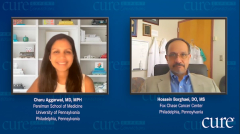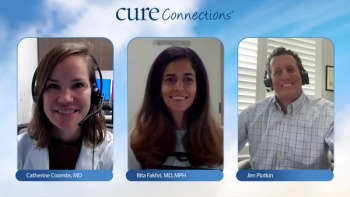
Counseling Patients With NSCLC About Molecular Testing
What patients need to know about molecular testing and treatment decisions in non-small cell lung cancer.
Episodes in this series

Charu Aggarwal, M.D., MPH: I normally approach molecular testing exactly how you pointed out, Hoss. I spend at least more than half of my first visit with my patients with newly diagnosed lung cancer explaining the concept of biomarkers and the importance of biomarker testing. I have some aids that I use in the clinic where I divide my treatment paradigm into three buckets and say, “Not knowing anything about the tumor right now, your treatment could fall into one of the buckets, which could be either targeted therapy, immunotherapy, or chemotherapy-immunotherapy.” I try to simplify it for the patients saying that the way that we’ll select one of these buckets is by getting biomarkers. Some we can get from tissue only, and as you pointed out, some we can get from a combination of tissue and blood.
A lot of discussion revolves around PD-L1 testing. A lot of discussion also usually revolves around the differences between genetic testing for diseases that can be transmitted down in a hereditary, inheritable fashion, or whether these are restricted to just the lung cells and only the lung cancer.
It’s very important to make those distinctions as we educate our patients in the clinic, especially as they’re coming to terms with a diagnosis, learning the language of lung cancer, recognizing how stage IV is different from stage III and stage I, and how molecular testing can change outcomes and guide to the best decision. How do you approach discussion of molecular testing with patients in clinic? I know you talk about waiting, but are there circumstances where you say, “I really want molecular testing, but let’s just start with therapy?” Shed some light on that.
Hossein Borghaei, DO, MS: My approach is very similar to what you’re doing in terms of education and emphasizing the importance of molecular testing. There are certainly cases where I have started chemotherapy alone, without any immunotherapy, because we or a patient had concerns, or we all agreed that there’s enough of a disease burden that initiation of some form of therapy is absolutely indicated. Given the fact that even at the best of times a liquid panel can take seven to ten days to come back, sometimes you might not have that luxury of waiting. Initiation of standard chemotherapy is very appropriate and something that should be considered without any immunotherapy added to the mix.
Once you go through the description and explain why you’re recommending waiting until you get the molecular testing, the majority of our patients understand and are firmly in agreement with waiting. If you present the data as you can take a pill or you can come in for IV [intravenous] chemotherapy and all of that, it makes a difference to set the stage and provide the information as much as possible for the patient. We spend quite a lot of time talking about the importance of that. But patient preference and the anxiety of having a diagnosis of lung cancer, or advanced lung cancer, is tremendous, and we should acknowledge that.
Asking a patient with a diagnosis of advanced stage disease not to initiate treatment until they have more testing is another level of anxiety that puts a lot pressure on our patients. It’s important to take the time to explain things, while recognizing the anxiety. I often say, “Believe me, it’s as anxiety-inducing for me telling you to wait until we get everything.” It’s difficult, and we should recognize that part of it. But emphasizing the importance and how the treatment could completely change with the availability of molecular testing is important. We spend a lot of time on additional education. Sometimes our nursing staff do the same thing. That’s how we try to address some of the concerns that come up during that initial visit if we have to wait a little longer before we can do anything. Our approach is very similar to what you have said.
Transcript edited for clarity.

